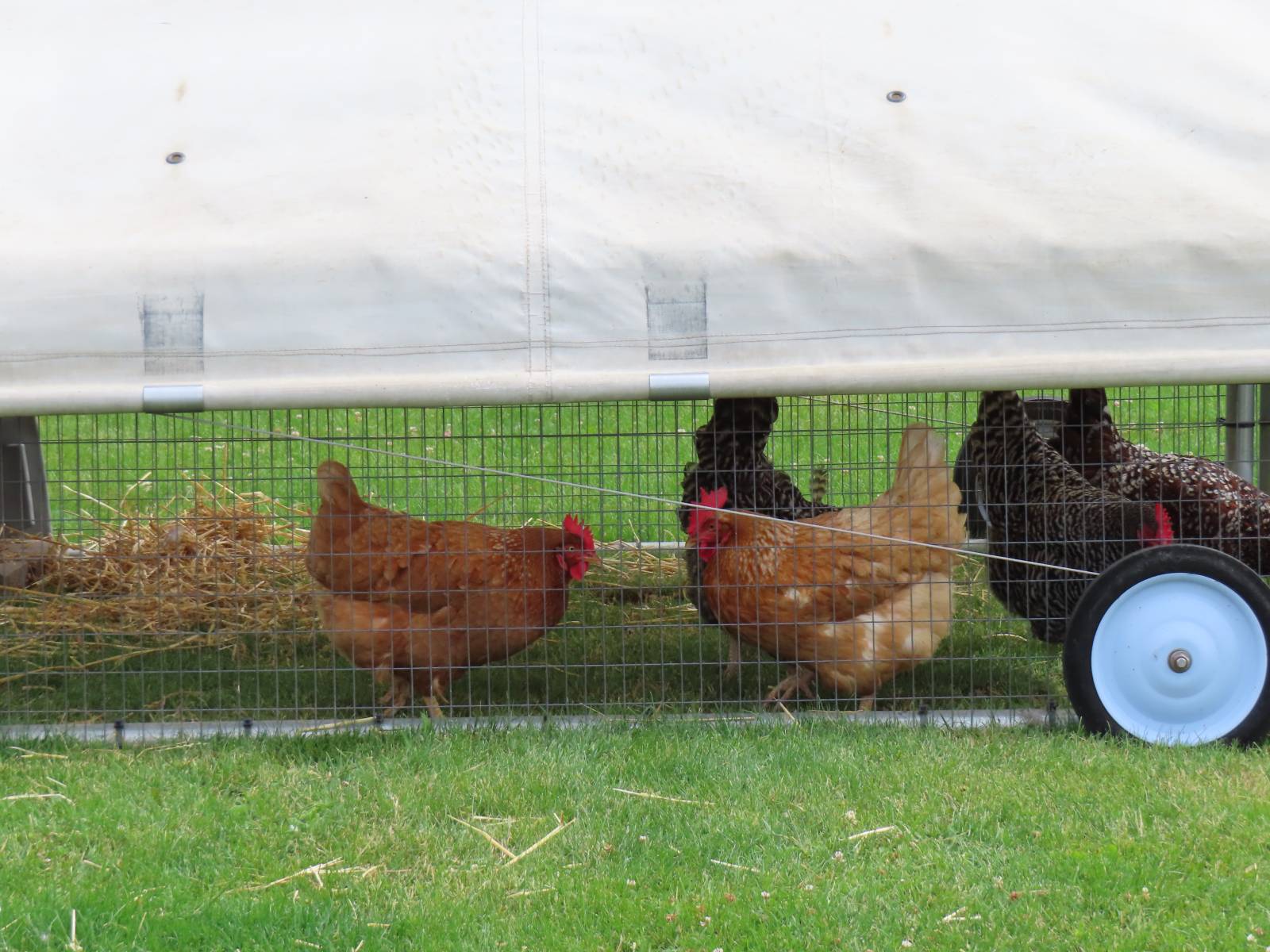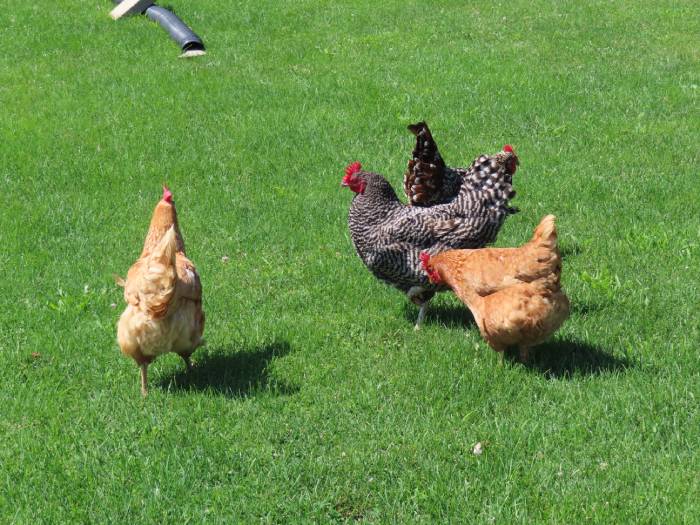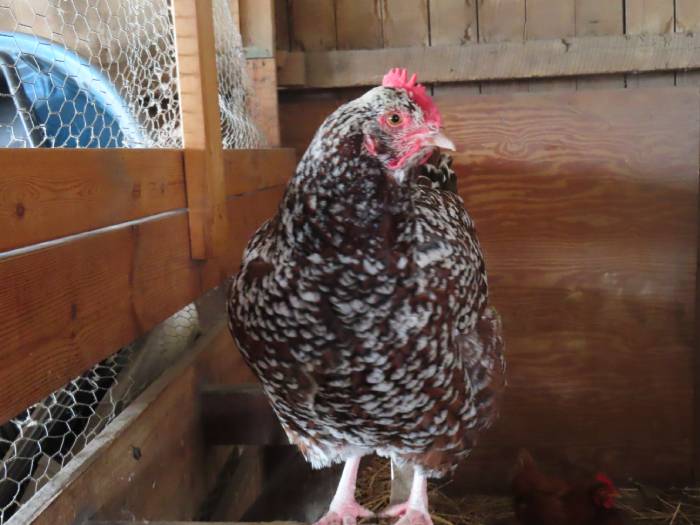
by Erin Snyder
Every chicken keeper has dealt with a bully in the flock, but what about bullies outside the flock? As more chicken coops pop up across rural and suburban communities, feral chickens are becoming a problem in backyards and neighborhoods.
While they may not seem problematic initially, feral chickens can threaten backyard flocks by bullying chickens and transmitting diseases. Discover how one flock safely overcame a feral rooster trying to take over the henhouse and what you can do to protect your flock from feral chickens.
A Feral Visitor
It all started one summer when I noticed my rooster, Jory, was crowing constantly. Since Jory was usually a quiet boy, I knew something was wrong, and quickly realized the cause when I heard a rooster in the distance answer him. But I assumed a neighboring farm had gotten chickens, so I didn’t give it much thought.
Several weeks passed, and I spotted a Silkie rooster several times a day around my property. He didn’t appear to belong to anyone, so I decided to try to rescue and rehome him. However, things didn’t go as planned.
It soon became apparent that Mr. Rooster didn’t want to be rescued; he wanted my hens. Whenever I tried to approach him, he would run back into the woods and reappear when I headed back inside.
Jory and the Silkie rooster battled out their differences with crowing competitions for a while. One day, my flock suddenly became eerily silent in the morning before I let them out. I also noticed that they seemed stressed and tense out in their run.
Meanwhile, Mr. Rooster kept crowing, and soon I was finding chicken poop around my barn. Since my chickens didn’t free-range, I knew the poop wasn’t from them, so that left only one culprit. Mr. Rooster decided the only way to get hens was to find a way into my barn. So, my chickens silently acted like they weren’t home while he patrolled the barn perimeters. (As long as no humans were around, of course!)
Victory At Last!
Weeks went by, and my chickens remained stressed and silent. I missed the happy flock I once had. I also missed hearing Jory’s crow ringing through the yard. But I could do little to remedy the situation with no way to remove Mr. Rooster from my backyard.
Until one morning, I heard the deep crow of a third rooster. My thought immediately was, “Not another rooster.” Of course, Mr. Rooster immediately crowed back. The third rooster crowed a second time, and again, Mr. Rooster answered.

When the third rooster crowed again, I realized something about his voice sounded familiar. As soon as the mysterious crower let out the third crow, Jory crowed his answer.
Together, Jory and the third rooster kept crowing. But who was the third rooster? There didn’t seem to be another rooster in the yard.
In a minute, I realized who the mystery chicken was as the queen of the flock threw back her head and let out another blast of her own. Jory immediately answered her.
Realizing he was outnumbered, Mr. Rooster retreated into the woods and was never seen again.
Protect Your Flock Dos and Don’ts
I learned an important lesson while dealing with the feral rooster. Chickens outside of our backyard flock can seriously impact the quality of our chickens’ lives. As chicken owners, we must do everything possible to keep our flocks safe and healthy and protect them from feral chicken bullies. Keeping your flock safe when feral chickens are around is possible with this helpful list of do’s and don’ts.
Dos
- Keep chickens confined to avoid direct contact with feral chickens. By avoiding direct contact, you can help protect your flock from diseases that feral chickens may carry. Like stray dogs and cats, stray chickens are more likely to harbor external and internal parasites. Protect your flock by preventing interactions.
- Strengthening the immune system is the best way to help your flock stay healthy. Supplement your flock’s diet with immune-boosting herbs such as fennel, oregano, and thyme. Supplementing their diet with probiotics and prebiotics can also be beneficial.
- Reducing stress levels will help keep your flock calm and healthy. Sprinkling calming herbs, such as lemon balm and lavender, around the coop and run will help your flock relax. Confining chickens to the coop for several days may also help reduce high-stress levels due to feral chickens. Be sure to remove feeders and water fountains from the run and place them in the coop during the confinement.
- Catching stray and feral chickens can be tricky, but if you can, rehoming them is the best way to prevent them from taking up residence in your backyard.
- Before adding stray or feral chickens to your flock, have each chicken undergo a 30 to 60-day quarantine. During quarantine, take them to a veterinarian for an exam, including checking each chicken for internal and external parasites.

Don’ts
- Never allow chickens to free-range (even if you are there to supervise them) if feral chickens are in your neighborhood. This practice will keep your flock from being brutally attacked and help protect them from diseases or internal parasites feral chickens may have.
- Even if you see a chicken wandering through your yard or down a country road, it doesn’t always mean it has been dumped. Free-range chickens are known to wander away and may stray far from home. Check around to see if the wayward chicken belongs to anyone nearby before rehoming them.
- To avoid the spreading of disease, never feed feral chickens. If you wish to catch them for rehoming purposes, feed them away from the coop and run. Be sure to use separate feeders and water fountains. Sanitize or discard feeders and water founts after feral chickens have been relocated.
Did you know? Dumping chickens is illegal in the U.S. Despite the risk of fines and jail time, many backyard chicken owners decide that raising chickens isn’t for them and release them into someone else’s neighborhood. Save a life, and don’t dump.
Dumping chickens is cruel, as domestic chicken breeds can’t survive on their own. Without feed or protection from predators, abandoned chickens often find themselves picked off by a predator or starved to death.
Sadly, feral chickens are becoming more common, but knowing what to do and what not to do can help your flock through this stressful situation.
All opinions expressed in the article are based on personal experience and the safety tips I put into practice to protect my flock.
Originally published in the October/November 2024 issue of Backyard Poultry and regularly vetted for accuracy.
…
backyardpoultry.iamcountryside.com
Feed Name : Backyard Poultry
Chickens 101,feral-chickens,rooster behavior,wild-chickens-in-hawaii
hashtags : #Keeping #Feral #Chickens #Flock






Leave A Comment